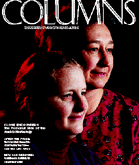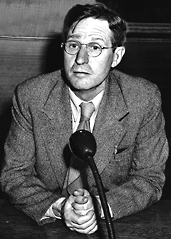

It is true that the UW culture of a giant "Research Factory Empire" tends to militate against serious undergraduate research, but that culture can be circumvented. Looking over my bibliography, I notice that nine different undergraduate research students have been co-authors of papers published over the last 20 years. It is true that this represents only a fraction of all the work my lab published over this period. However, the experimental work done by the better undergraduates was perfectly publishable and, as Professor Van Volkenburgh implies, was the most rewarding to supervise. Does the article on undergraduate research in Columns signal a change of fashion, so that this eccentricity of mine is about to become almost modish?
Professor Jonathan Gallant
UW Department of Genetics
I understand Hec Edmundson needs improvement, but an indoor practice facility? I played on the team during the 1981 and 1982 Rose Bowl years. We didn't have an indoor facility, and did just fine, thank you.
Once again, the arrogance of the athletic administration shows its true colors. Was this assessment put to a vote of the fans? Is it optional? No, it is crammed down the throat of every season ticket holder. It was agreed to by a committee made up of some very wealthy individuals.
The upper deck of the stadium was built using private donations; why can't this fund be similarly financed? We could have let Paul Allen help out, and the rent from the Seahawks could have gone toward this fund. But no, the administration knows better.
Unfortunately, I have too much respect for the team to simply cancel my tickets. I am fast losing respect for the athletic department administration.
David Matthews, '88
Phoenix
Athletic Director Barbara Hedges replies: Because other loyal fans share some of these questions and concerns, I want to provide additional information. The Huskies recently embarked upon a much needed, $70 million athletic facilities upgrade. Countless hours of research were devoted to what was needed, how much it would cost and how we would pay for it. The research included interviews with coaches, student-athletes, alumni, community leaders and fans. Last summer the athletic department conducted focus groups with randomly selected season ticket holders including both Tyee contributors and general public purchases. As a result of our research, we discovered that in order to remain a leader in college athletics and continue to be nationally competitive in each of the program's 23 sports, we needed to upgrade facilities. Plans call for quality facilities that are functional and will withstand the test of time. However, they are neither excessive nor overdone. The athletics program is a totally self-sustaining department of the University. For this reason, Husky season ticket holders are being asked to help. Proceeds will be used for Hec Ed and the indoor practice facility. This season ticket fund will be in place for five years. With help from alumni, fans and the people throughout the state of Washington, the UW will continue to excel nationally on the field of play as well as in the classroom.
Bruce S. M. Lee, '78
Cupertino, Calif.
Editor's Note: Lee, who worked on the Star system at Xerox from 1979 to 1988, is correct. The Xerox public relations office sent us the wrong slide.
Don Butler, '47
Seattle

Your selection of comments on "Seeing Red" confirms what we already knew: the more things change, the more they stay the same. At Professor Herbert Phillips' faculty trial, testifying to the excellence of his teaching, I was startled, dismayed, terrified by the seething hatred of the prosecutor brought to the campus by President Allen. Years later, on the fourth floor of the Administration Building, I was startled, dismayed, disgusted to hear a quite high functionary interrupt a discussion of Melvin Rader's False Witness with an angry, "I still think he was a Communist!"
However, I continue to believe the University is one of the better things going in Seattle, Renton, Redmond, Federal Way, and I would hope that before you come to editorial closure, you do something in the way of an honor roll.
The University of Washington Press comes to mind, and with it, the restoration of faculty centrality in the governance of the University by President Charles E. Odegaard.
The band of professors and staff who took it upon themselves to contribute to "retirement" support of [Professor] Joe Butterworth after he was cast out into destitution by Allen.
The distinguished faculty who declared the President's Mansion out of bounds and thereby drove Allen in disgrace to Southern California.
The ex-students and friends who, when in San Francisco, checked in with "Scoop" [Herbert Philips].
The Blue Moon regulars who considered it not a charity but an honor to buy Joe Butterworth a beer, and if there were space at his booth, enjoyed the pleasure of his company.
The "All Powers Project" commemorating the 50 year anniversary, of course, and while we're at it, put "Seeing Red" on the honor roll too.
Harvey Manning, '45
Bellevue
Editor's Note: Manning was editor of the Washington Alumnus, precursor to Columns, from 1962 to 1968.
So it was with some relief that I found a few disgruntled (though cleverly edited) letters in response to Wick's little travesty. They made some good points--mostly with regard to the murderous nature of Soviet Communism--but none I read pointed out what I found most appalling about the piece: Wick's self-righteous conceit that some exalted principle of "academic freedom" was at stake, and that the faculty bullies and buffoons who justifiably lost their jobs for their execrable political affiliations were some sort of victims of a less enlightened time. One need only imagine that, if these had been card-carrying Nazis rather than card-carrying Communists, Wick would hardly be blubbering today for the cause of their academic freedom. Clearly, Wick and her lefty friends have a soft spot for some totalitarian butchers but not for others.
And no, I'm not impressed that Wick's item won some awards from organizations which no doubt share her political biases. Lefties--especially lefty journalists--congratulate themselves endlessly in this way, and have done so for decades. There's certainly nothing noteworthy in that.
Patrick Deshaye, '81
Sacramento, Calif.
You should be very thankful that there were people in 1948 who were aware and intelligent enough to see the truth. Let us hope the same for today!
Fareeja Yafiss, '65
Seattle
Without naming the professor and the department, this class and this whole department was nothing but a jobs program for a bunch of burned out Marxist radicals from the 1960s. After several weeks of trying to figure out what the course was about I went--in frustration, but with an open mind and attitude--to the professor's office hours. I sincerely wanted to try and determine where we had been and where we were going with this class. The meeting went downhill right after the introductions and the professor was obviously incensed that someone would dare ask him what the purpose of his class was. I brought the meeting to a close when it was clear that the professor wasn't going to break out of his practiced steady drumbeat of politicized gibberish. I was also concerned that he was going to leap across his desk screaming, "counter-revolutionary--you must be silenced!" His piercing and smoldering glare reflected a man consumed with political warfare. Also someone who attacked an imaginary status quo to legitimize himself. He was the status quo!
Personally, I think he missed his calling. He would have been great as some Ministry of Information party hack in the former East Germany or former Soviet Union. I guess he could still put in a few good years in Cuba or North Korea.
As opposed to the "Seeing Red" era, I think the only McCarthyism present when I was going to the University of Washington was ostracism for anyone who dared oppose a professor's ranting and raving. Clearly a lockstep, group-think environment existed in this department. I don't think that anyone from the college or university was going to try to tell this department how to run things. But I think this department needed and probably still does need a reality check. There's a difference between freedom of speech and iconoclastic drivel paid for with public funds.
John R. Mills, '87
Dumfries, Va.
When the McCarthy Terror poisoned our democratic values, the Federal Communications Commission issued me a questionnaire that I refused to comply with, so renewal of my licenses were denied. At that time I was working for CBS's Philadelphia station, WCAU-TV. Without a license, I was forced into retirement at the age of 53. CBS evidently had some sympathy for me and gave me a pension. The chief engineer under whom I worked told me that he was approached four times by the FBI to discharge me, but his position was that there was nothing wrong with my work. He would not discharge me. However, when the FCC denied renewal of my license, I could not continue my work.
So there it is, denied a commission and forced to retire at an early age. I thought you would like to see how the poisoning of our democracy hit the bottom of the education ladder. ... I enjoy reading Columns and in particular you are doing a good job as editor. Thank you.
John Bolmarcich
Warminster, Pa.
Visit this page for all reader comments on "Seeing Red".
Also, the "Our Back Pages" article in that issue incorrectly reported that Mark Haselkorn is the current chair of the Department of Technical Communication. He is a former chair; the current chair is Judy Ramey.
In the March 1998 article "Close Encounters," which described research papers published posthumously by John Konecki, we regret that we did not list all the authors of his three posthumous articles. Carol Ann Woody was the second author on these three articles and played an important role in their preparation and publication.
Send a letter to the editor at columns@u.washington.edu.